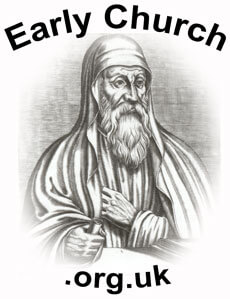Theology on the Web helps over 2.5 million people every year to find high quality theological resources that will help to equip them to serve God and to know Him better (2 Timothy 2:15). Like other websites that provide free services, it is dependent on donations to enable it to grow and develop and only 0.004% of visitors currently do so. If you would like to support this site, please use one of the options to the right of this message.
Synopsis
ALEXANDER patriarch of Alexandria 313-326. Under him
the Arian controversy broke out in 319. Arius was
condemned by a synod in Alexandria, in 320. at which a hundred bishops were
present. When banished, he went to Palestine; and, as he was well received
there, Alexander wrote first to certain bishops separately, then an encyclical
letter to all the bishops of the church, setting forth the errors of Arius. The
interference of the Emperor Constantine, though
intended to still the rising storm, gave only occasion to more debate; and in 325 the first ecumenical council followed. Of
Alexander's letters two have come down to us, - one having been preserved by
Socrates (I. 6), and another by Theodoret (I. 4).
"ALEXANDER," Philip Schaff, ed., A
Religious Encyclopaedia or Dictionary of Biblical, Historical, Doctrinal, and
Practical Theology, 3rd edn., Vol. 1. Toronto, New York & London: Funk
& Wagnalls Company, 1894. p.53.
 |
Alexander of Alexandria, Ante-Nicene
Fathers, Vol. 6: 289-304. |
 |
Athanasius, Defense Against the the
Arians. |
 |
Epiphanius, Panarion 69.4. |
 |
Socrates, Church History 1.5-6,
9. |
 |
Sozomen, Church History 1.15. |
 |
Theodoret, Church History 1.4. |
 |
St
Alexander (Catholic Encyclopedia) |
 |
Pauline Allen, "The Festal Letters of the Patriarchs of Alexandria: Evidence for Social History in the Fourth and Fifth Centuries," Phronema 29.1 (2014): 1-19. |
 |
V. Burrus, "The Heretical Woman as
Symbol in (bishop) Alexander, Athanasius, Epiphanius, and Jerome," Harvard
Theological Review 84 (1991): 229-48. |
 |
M.J. Edwards, "Alexander of Alexandria and the Homoousion," Vigiliae Christianae 66.5 (2012): 482–502. |
 |
Adam C. English, "Alexander of Alexandria, Arius, and Theological Method,\" Phronema 30.1 (2015): 1–22. |
 |
M.J. Edwards, "Alexander of Alexandria and the Homoousion," Vigiliae Christianae 66.5 (2012): 482–502. |
 |
Alvyn Pettersen, "The Arian Context of Athanasius of Alexandria’s Tomus Ad Antiochenos VII," The Journal of Ecclesiastical History 41.2 (April 1990): 183-198. |
Related Subjects











